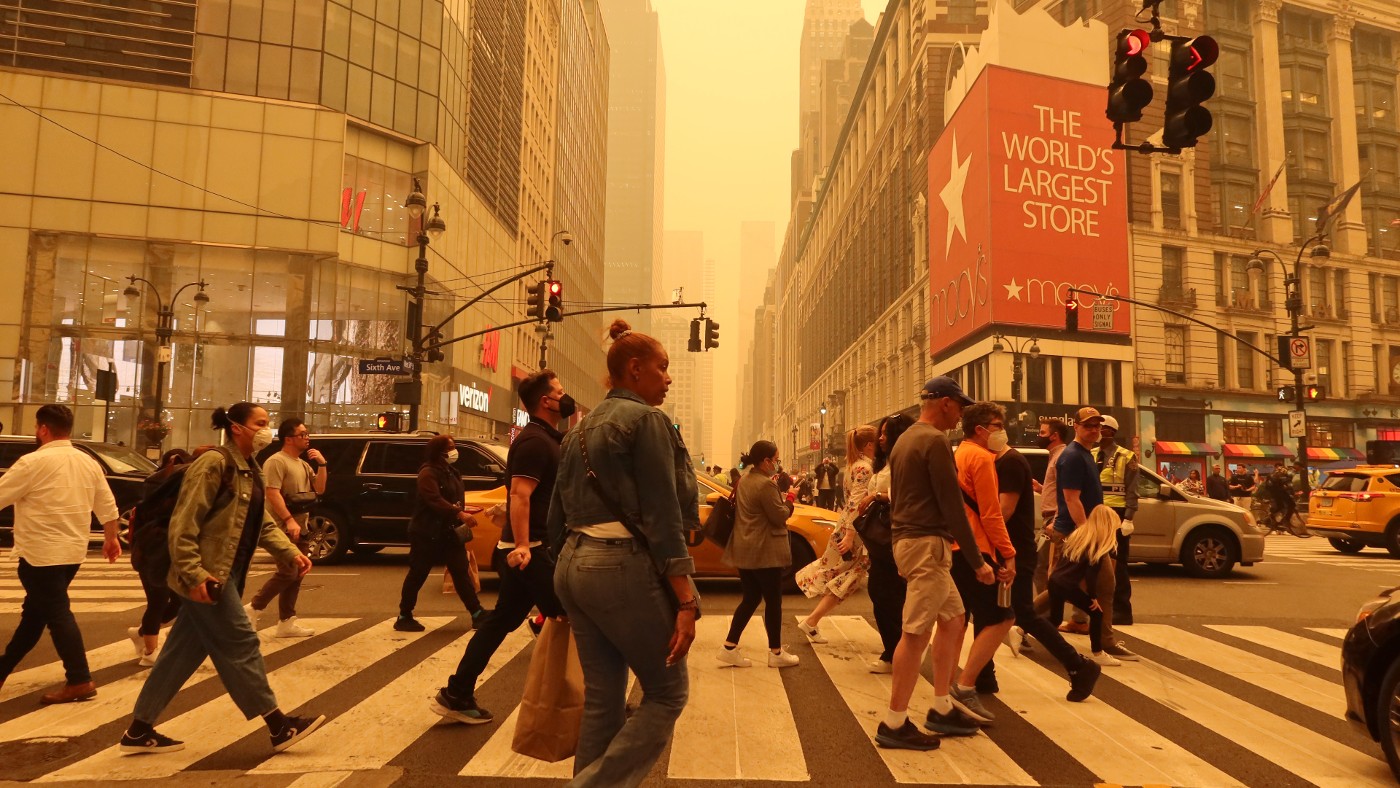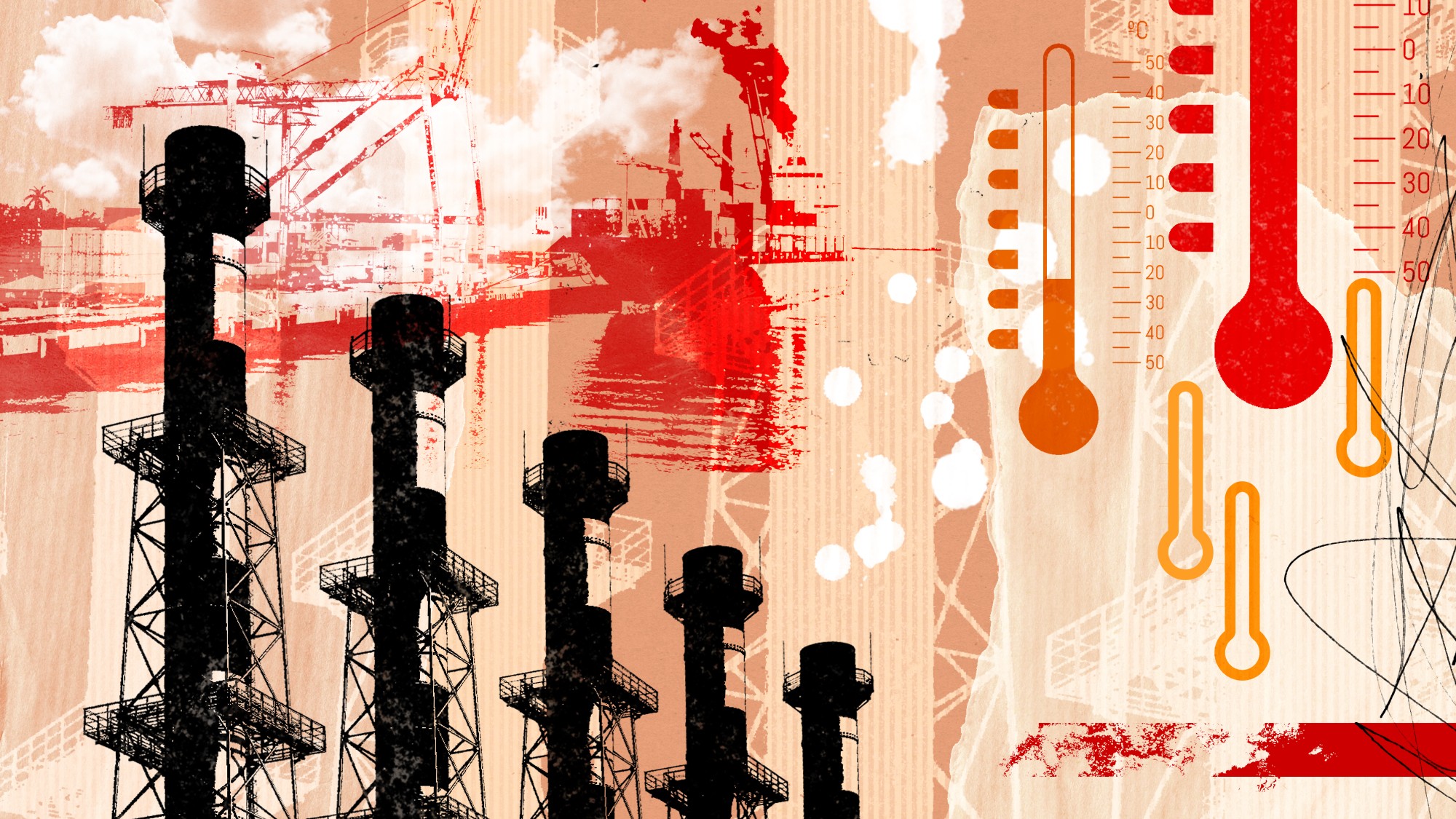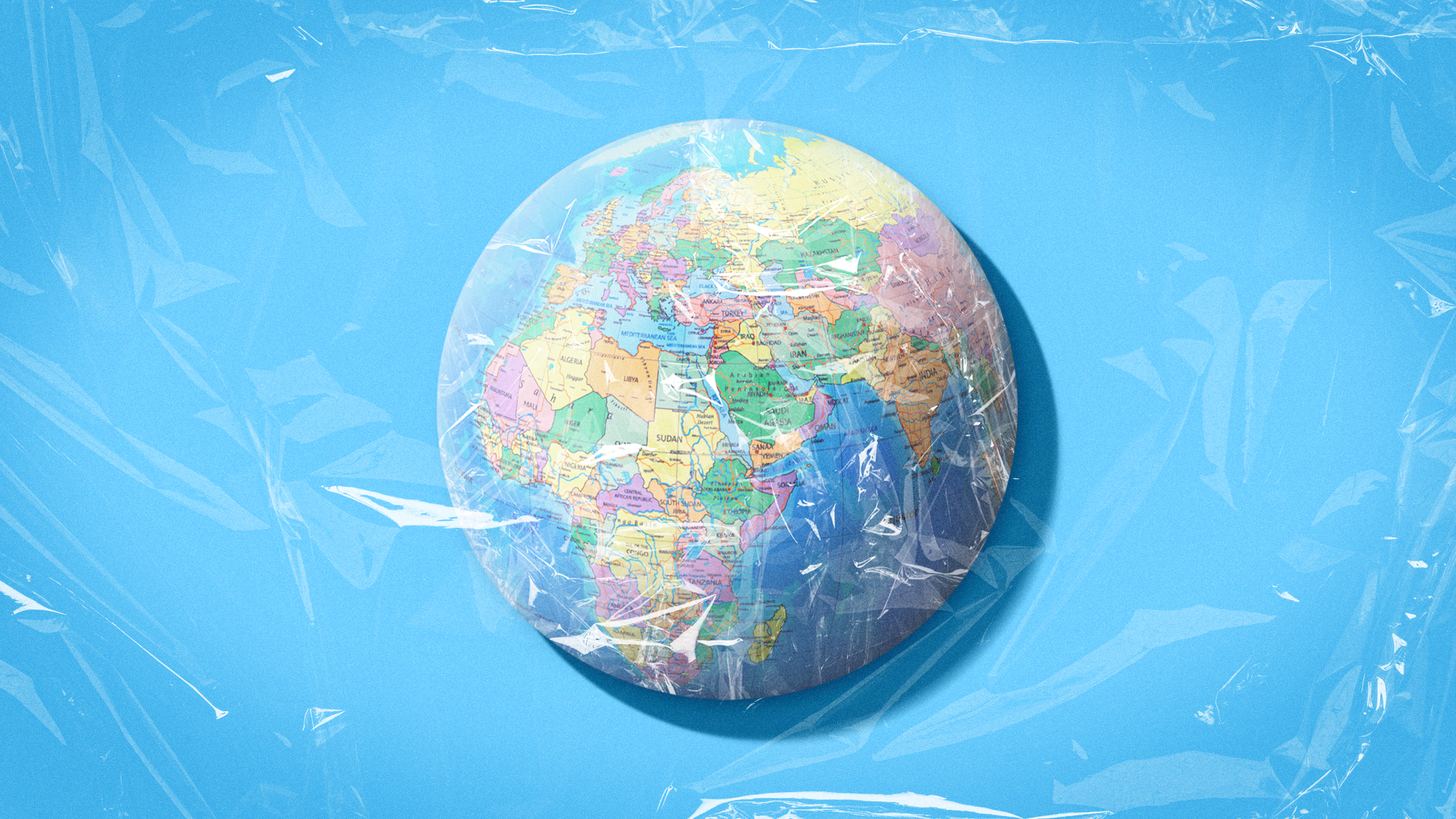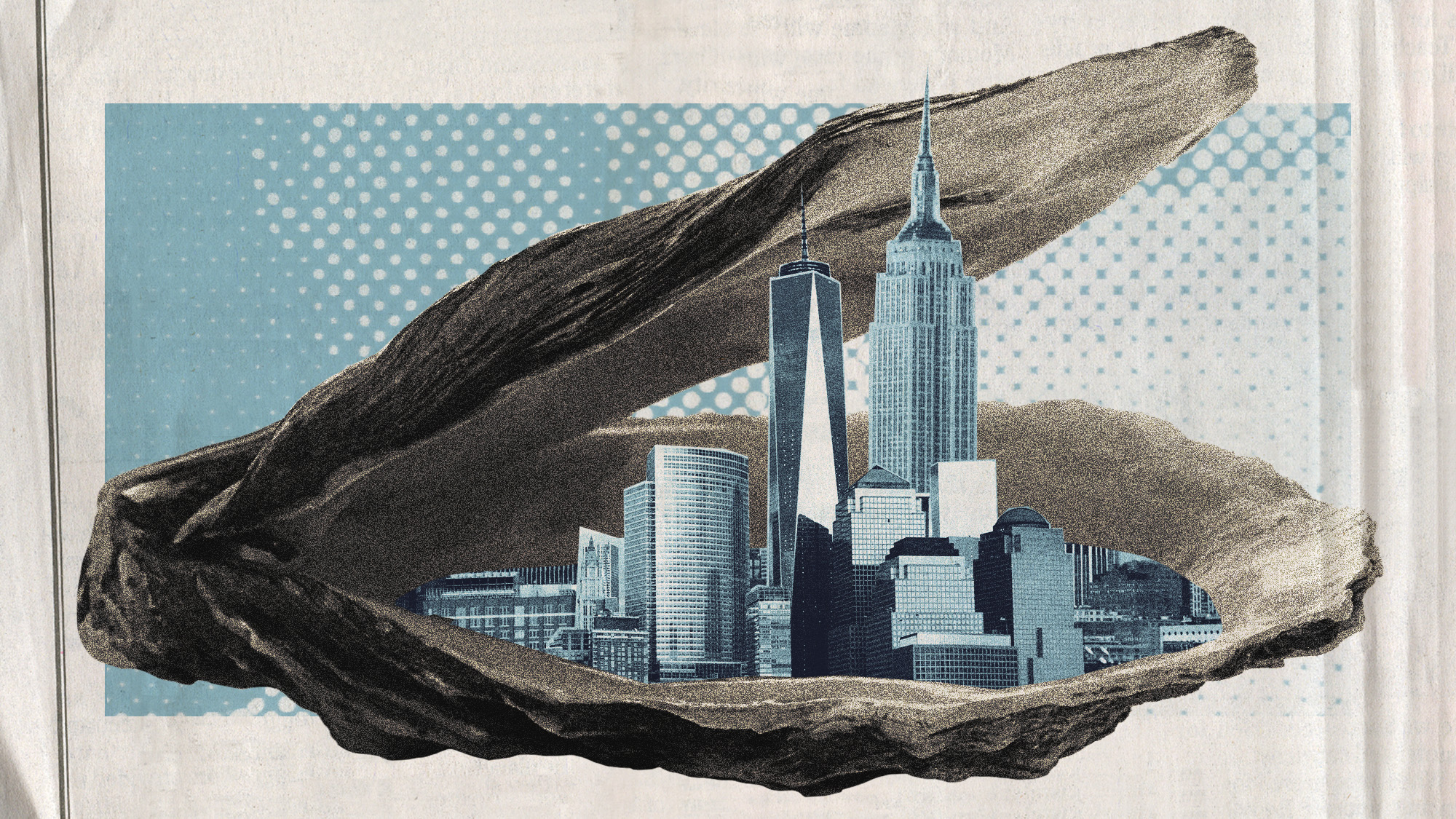The world’s most polluted cities
Ongoing wildfires in Canada brought historic levels of toxic air pollution to New York

A free daily email with the biggest news stories of the day – and the best features from TheWeek.com
You are now subscribed
Your newsletter sign-up was successful
New York was ranked as the world’s most polluted city after smoke billowing in from Canadian wildfires left residents choking on a thick cloud of smog.
Mayor Eric Adams urged New Yorkers to stay indoors and reduce activity levels at the height of the crisis earlier this month, when data suggested that breathing in the air in the city for 24 hours was equivalent to smoking 22 cigarettes.
Residents of other US cities including Washington D.C. and Philadelphia also suffered very poor air quality as a result of smoke from the fires, which impacted “nearly 100 million people” in North America, said the BBC.
The Week
Escape your echo chamber. Get the facts behind the news, plus analysis from multiple perspectives.

Sign up for The Week's Free Newsletters
From our morning news briefing to a weekly Good News Newsletter, get the best of The Week delivered directly to your inbox.
From our morning news briefing to a weekly Good News Newsletter, get the best of The Week delivered directly to your inbox.
Analysis by researchers at Stanford University found that the US had experienced the highest levels of exposure to such pollution since a dataset on smoky conditions began in 2006. “It’s the worst by far, I mean, Jesus, it was bad,” environmental scientist Marshall Burke, who led the research, told The Guardian.
Much of the smoke came from Quebec, where 150 fires were burning, in what is already set to be the Canadian province’s worst ever fire season.
How is air pollution measured?
Different countries have their own air quality indexes, corresponding to different national air quality standards.
Air quality tech firm IQAir shares a live global ranking of countries with the worst air quality. The Swiss company measures various pollutants, including particulates, ozone, nitrogen dioxide, carbon monoxide and sulfur dioxide, to provide an Air Quality Index (AQI) based on the health effects associated with a pollutant.
A free daily email with the biggest news stories of the day – and the best features from TheWeek.com
An AQI value of more than 151 is classed as unhealthy, while 201-300 is very unhealthy and 301+ is hazardous. A value of 101-150 is classed as unhealthy for sensitive groups, while 51-100 is moderate, and up to 50 is good.
On 7 June, New York City’s air reached 353 on the index, “far worse” than the next most polluted city at the time, New Delhi on 190, said the New York Post.
The Big Apple’s air quality was “more than 56 times over the World Health Organization’s safety limit”, the Daily Mail reported.
Which are the world’s most polluted cities?
In a study prior to the pandemic, the WHO found that 99% of the world’s population lived in places that did not meet its guidelines for healthy air quality.
According to the IQAir Air Quality Index (AQI), which is constantly updated, these were the most polluted cities as of 2pm today.
- Lahore, Pakistan (157)
- Hanoi, Vietnam (119)
- Dhaka, Bangladesh (118)
- Seoul, South Korea (117)
- Karachi, Pakistan (116)
- Johannesburg, South Africa (112)
- Doha, Qatar (107)
- Astana, Kazakhstan (106)
- Chicago, US (98)
- Santiago, Chile (95)
What are the dangers of breathing polluted air?
Being exposed to a high level of fine particulate matter, which is what turned the sky orange in New York, can “increase your risk of hospital admission either for cardiovascular respiratory disease on the same day, on the day after, or up to two or three weeks after”, wrote Francesca Dominici, a professor of biostatistics at Harvard.
According to the Energy Policy Institute at the University of Chicago, sustained air pollution takes 2.2 years off the global life expectancy for each person – more than smoking or alcohol.
Research has also found that air pollution causes a “huge” reduction in intelligence, and that students who take exams amid heavy air pollution may perform worse than those who take the same test on a clear day.
Will polluted air become more common?
As a result of wildfires, “unfortunately, yes”, predicted Harvard professor Dominici. Studies have demonstrated that “even with moderate to aggressive climate change regulation in terms of targeting greenhouse gases, we are going to see a higher occurrence of wildfires” and “they will be both more common and more intense”, she said.
A study last year found that “virtually every home in the UK is subjected to air pollution above World Health Organization guidelines”, The Guardian’s environment editor Damian Carrington reported. More than 97% of UK addresses exceeded WHO limits for at least one of three key pollutants, while 70% breached WHO limits for all three.
Chas Newkey-Burden has been part of The Week Digital team for more than a decade and a journalist for 25 years, starting out on the irreverent football weekly 90 Minutes, before moving to lifestyle magazines Loaded and Attitude. He was a columnist for The Big Issue and landed a world exclusive with David Beckham that became the weekly magazine’s bestselling issue. He now writes regularly for The Guardian, The Telegraph, The Independent, Metro, FourFourTwo and the i new site. He is also the author of a number of non-fiction books.
-
 The environmental cost of GLP-1s
The environmental cost of GLP-1sThe explainer Producing the drugs is a dirty process
-
 Greenland’s capital becomes ground zero for the country’s diplomatic straits
Greenland’s capital becomes ground zero for the country’s diplomatic straitsIN THE SPOTLIGHT A flurry of new consular activity in Nuuk shows how important Greenland has become to Europeans’ anxiety about American imperialism
-
 ‘This is something that happens all too often’
‘This is something that happens all too often’Instant Opinion Opinion, comment and editorials of the day
-
 The environmental cost of GLP-1s
The environmental cost of GLP-1sThe explainer Producing the drugs is a dirty process
-
 ‘Like a gas chamber’: the air pollution throttling Delhi
‘Like a gas chamber’: the air pollution throttling DelhiUnder The Radar Indian capital has tried cloud seeding to address the crisis, which has seen schools closed and outdoor events suspended
-
 How clean-air efforts may have exacerbated global warming
How clean-air efforts may have exacerbated global warmingUnder the Radar Air pollution artificially cooled the Earth, ‘masking’ extent of temperature increase
-
 Why is the world so divided over plastics?
Why is the world so divided over plastics?Today's Big Question UN negotiations on first global plastic treaty are at stake, as fossil fuel companies, petrostates and plastic industry work to resist a legal cap on production
-
 Anti-anxiety drug has a not-too-surprising effect on fish
Anti-anxiety drug has a not-too-surprising effect on fishUnder the radar The fish act bolder and take more risks
-
 Oysters from New York's past could shore up its future
Oysters from New York's past could shore up its futureUnder the Radar Project aims to seed a billion oysters in the city's waterways to improve water quality, fight coastal erosion and protect against storm surges
-
 Canada's carbon tax in the crosshairs
Canada's carbon tax in the crosshairsUnder the radar PM Justin Trudeau's flagship green policy has become increasingly unpopular as citizens grapple with high inflation and cost-of-living crisis
-
 The war on polar bears
The war on polar bearsUnder the Radar Clashes with human settlements are on the rise, as melting ice drives hungry predators inland in search of food